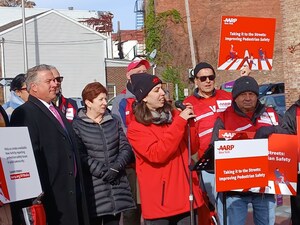AARP's Fraud Watch Network Turns the Tables on Con Artists
Major Telephone Outreach Effort Warns Consumers of Fraud and Scams via Phone
BOSTON, Sept. 17, 2015 /PRNewswire-USNewswire/ -- The AARP Fraud Watch Network lit up the phone lines today as part of an effort to warn thousands of consumers about two leading "imposter scams" that last year victimized more than 10,000 New Yorkers.
Borrowing a favorite tactic of con artists, AARP Fraud Watch Network staff and volunteers from New York and New England states joined to operate their own telephone call bank today in Boston. But instead of hearing from crooks, local residents received tips and information on how to protect themselves from "imposter scams." Impersonating police officers, federal agents or financial service companies, scammers use their "authority" to scare a person into paying them. Or, they pretend to be a friend or loved one in trouble who needs money.
AARP New York State Director Beth Finkel and the association's New York State President, Leo Asen, joined the volunteers as they made calls to hundreds of New Yorkers warning them of two key imposter scams: IRS and "tech support." According to the Federal Trade Commission list of top consumer fraud complaints last year, 10,781 New Yorkers were victims of imposter scams.
"Con artists think they can bully people into forking over their hard-earned money," said Beth Finkel, State Director for AARP in New York State. "That's why today, we're turning the tables on them, arming Americans with the information they need so they know what to watch out for."
In the IRS scam, you receive a phone call from an IRS official ordering you to pay back taxes or face arrest. In the tech support scam, you're told your computer has a virus and they need remote access to your computer to fix it.
"We're giving people the facts: The IRS will never call you over the phone and demand payment. Any initial communication will come through the mail," said Leo Asen, AARP New York State President. "And, Microsoft or other large computer companies will not call you unsolicited asking for access to your computer and demand payment."
The outbound call effort, sometimes known as a "reverse boiler room" operation, is part of a partnership between the AARP Fraud Watch Network and state Attorney General's Offices and brings together volunteers from across New York and New England trained in coaching people how to spot and avoid scams.
New York State Attorney General Eric T. Schneiderman will be contacting New Yorkers to warn them of the danger of scams and provide both the AARP Fraud Watch Network toll free telephone number to receive scam alerts, 877-908-3360, and his office's toll-free number to report them, 800-771-7755.
The Fraud Watch Network arms people with the information they need to spot and avoid scams so they can protect themselves and their families. By signing up for the Fraud Watch Network, consumers get access to:
- The latest scam alerts, delivered right to your inbox.
- A scam tracking map featuring warnings from local law enforcement and first-hand accounts of breaking scams from people in your state.
- The Con Artist Playbook – interviews with con artists who reveal how they steal your hard-earned money.
- A fraud hotline you can call to talk to a trained volunteer for advice if you are worried you or a loved one has been scammed or if you suspect a scam in your community.
Volunteers and staff shared the following tips with call recipients:
Fraud Watch Network Tax Scam Protection Tips
Know that the IRS does not:
- call to demand immediate payment about taxes owed without first sending you a notification by mail,
- ask for credit or debit card numbers over the phone,
- threaten to bring in local police or other law enforcement to arrest you for nonpayment.
Fraud Watch Network Tech Scams Protection Tips
- Scammers claim affiliation with Microsoft, "Windows," computer manufacturers or others, but legitimate employees of those companies don't make phone calls or send "personal" email warnings about an infection in a particular computer. When real threats are detected, a security update or warning is usually sent en masse – and directly to your computer by the manufacturer of the antivirus protection installed on your machine.
- Unless you initiate contact with a trusted technology assistance firm like Geek Squad, never give strangers remote access to your computer. (They may get it by asking you to type a certain code, download a program they provide, or provide them with your username and password.)
- Don't be fooled if a phoning tech support scammer knows your name, address or even the operating system you're using. Cybercrooks glean their targets through public phone directories and often "guess" your operating system by citing more popular ones.
- At least once a week, check for updates in your security software and run scans several times a week.
- For legitimate tech support, Microsoft users can call 877-696-7786 and Mac users can call Apple at 800-275-2273. Do not trust other phone numbers provided in calls or emails, as they may belong to scammers.
SOURCE AARP New York
Related Links
WANT YOUR COMPANY'S NEWS FEATURED ON PRNEWSWIRE.COM?
Newsrooms &
Influencers
Digital Media
Outlets
Journalists
Opted In





Share this article